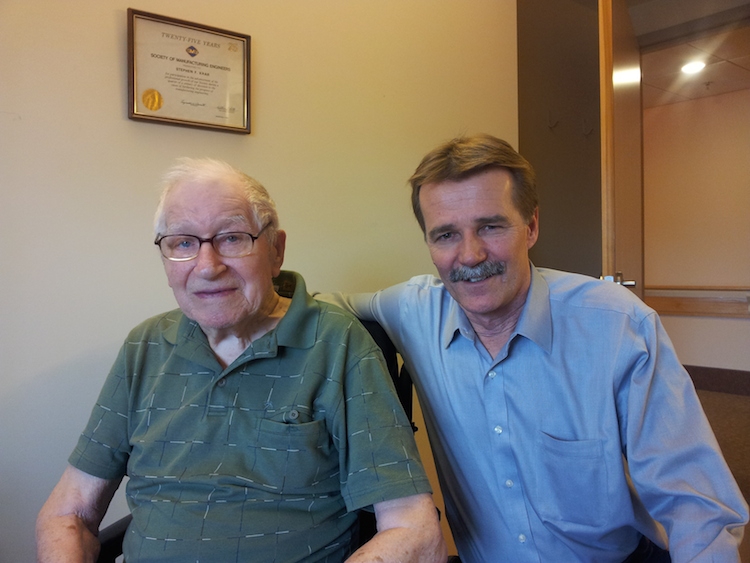
Jun. 25, 2015 – This thought has been on my mind quite a bit lately, perhaps it’s because I just visited a 90-year-old friend in his new retirement home.
Or perhaps it’s just because everything that gets started has to end sometime. We are counselled “to begin with the end in mind”, but that’s easier said than done. We get caught up in the here-and-now, and the relentless petitions of what needs to get done next, that we take our eye off of the horizon and forget to calibrate our sites on the point at where we hope to end up. In this age of continually emerging game changing ideas and technologies, it is not only hard to do this, it’s critical to do as well.
Steve Krar, my aforementioned 90-year-old friend, has lived through a lifetime of rapid changes in manufacturing technology, but he continues to keep his eyes on the horizon. His work is not yet complete, and he never wavers from his course. His goal is to educate, inspire, stimulate and motivate others; to embrace, adopt and continue developing new ideas, practices, products and technologies for our industry. To him, it’s the most exciting one in the world; it’s the industry that actually makes things, moulds things, shapes things and creates things. And it does more than that; it creates meaningful work opportunities for millions of people, and provides a living and lifestyle for many, many more. It gives us the opportunity to use our hands and our brains.
Over 50 years ago, Steve and his buddies started a little venture called the Advanced Technology Think Tank (check out www.attt.ca). The purpose was to spend some time with a few like-minded thinkers, away from the regular distractions and demands of their careers, to take a look at the forest away from the trees. They would do this by going into the forest for a couple of days, rent cabins, pack fishing gear and enough food (and beer), and then allow thoughts and conversations not just about what is, but also what could be. Over the years, the event has grown (although it’s still comfortably small), and has attracted innovation thinkers from all over the world. Even though technology has changed, Steve’s vision for the event and his life in general have stayed on a straight and consistent path.
Right now, with the help of friends, Steve continues to sort through new information and old published works. He has authored and co-authored 86 books, and is in the process of consolidating new material to publish a book on the history of manufacturing — the man never stops.
In business today, our attention seems naturally drawn to the excitement of something new — the quest for the next new thing, or the execution of a tried and proven practice. We are often hesitant to think about finishing something well, perhaps because once we get something running the way we want it to, we hope that it will go on forever. But it won’t, because nothing lasts forever. Whatever it is, will eventually end, evolve or change to the point that it no longer looks like what it did at the start. I think we need to continually think about finishing well just as much as we need to plan to start well and manage wisely. Business, as in life, is full of beginnings and endings. Most beginnings start with excitement, great hopes and lots of anticipation. Too often though, the endings come as a surprise, without warning and in ways we don’t expect. When that happens, all of the achievements up to that point become unharvest-able, and lost to the future generations. One of our primary goals as leaders needs to be on finishing well.
Some people, like Steve, continually focus on finishing well, whether it’s the latest book they are writing, or the school curriculum they are teaching, or the next group of innovators they are inspiring. Whatever activity they are doing, they have the end in mind, and finishing well is the only way they know how to do things. They are not afraid of endings, because when they set their eye on the horizon, they know the next important goal will come into view.
Good leaders aren’t afraid of the endings — in fact, that’s what they are aiming for.
Paul Hogendoorn (paulh@getfreepoint.com) is co-founder of FreePoint Technologies, “Measure. Analyze. Share.” (Don’t forget to share!)
This column originally appeared in the June 2015 issue of Manufacturing AUTOMATION.
Advertisement
- Omron offers S8VK switching power supplies for hazardous environments
- Machine safety gets you soaring towards productivity and profitability
 L to R: Steve Krar and Paul Hogendoorn
L to R: Steve Krar and Paul Hogendoorn